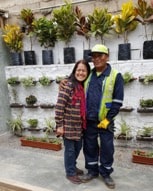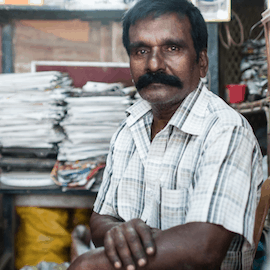Enabling the Business of Recycling: How Innovative Public-Private Partnerships Help to Build Sustainable Cities
Historically, conversations around environmental sustainability and climate change have been narrowly focused on whether solutions should be led by government or business. This often reduced the discussion to a false dichotomy: better policies vs. better business practices.
Thankfully these conversations are becoming more nuanced. These days, discussions are more often focusing on how global leaders and local stakeholders can work together to bring real and sustainable change—where are the shared goals and interests, and how can partners use those shared interests to develop collaborations that work? How can groups build resilience in partnerships and not just in programs?
Optimizing how organizations work together to create mutual benefit is an essential and often overlooked part of creating business solutions that generate positive social impact.
Public-private partnerships: The case of Peru
Growing cities, particularly in Latin America, are natural places for this collaborative work because of the evolving economy in urbanized areas. In Latin America, an astonishing 80 percent of the population lives in cities, which is the highest rate among emerging regions. One strong example of a collaborative solution that has generated multiple mutual benefits is an innovative public-private partnership in Peru tackling the global challenge of environmentally sustainable waste management.
During the past several years, the government of Peru has worked closely with communities and civil society organizations across the country to create a regulatory framework that decentralizes responsibility for environmental stewardship. Under the framework, local governments and communities manage environmental initiatives and partner with a unique set of community-based social enterprises, led and staffed by individuals who were once informal waste-pickers (“recicladores”). They collect recyclables from hundreds of thousands of households around the country. Bottling companies and waste exporters buy the recyclable material, which in turn feeds a domestic market for recycled goods that the government has promoted in partnership with the private sector. With this collaboration among municipalities, private companies, social enterprises and local communities, a new culture of recycling is growing rapidly in Peru, and new market opportunities are following in its wake.

Recycler with Ciudad Saludable founder Albina Ruiz
Mastercard’s Center for Inclusive Growth partnered with the Global Fairness Initiative (GFI) and Ciudad Saludable (Healthy Cities) to assess the impact and growth opportunity of this model. In “Inclusive Waste Management in Peru: Enabling the Business of Recycling,” GFI details how Peru’s recycling initiative enabled municipalities to fulfill an environmental mandate by partnering with waste-pickers to deliver recycling services to households and businesses that had never recycled before. Companies such as bottlers and paper manufacturers have also played an important role, by broadening where they source recyclable materials. Expanded sourcing helps companies reduce transportation costs and dependence on imports, and helps mitigate international price fluctuations in raw materials. The model’s unique reliance on community-led, market-based environmental management has led to the creation of more than 60 reciclador-owned social enterprises serving 200 municipalities and benefiting more than 5.6 million Peruvians directly. These enterprises have also helped vulnerable waste-pickers leave the landfills and the streets, providing them with a reliable income and a safe place to work. It has given them a formal, respected role within municipalities and with the general public, which is increasingly aware of the recicladores’ role in Peru’s environmental future.
The Peruvian inclusive recycling experience offers relevant insights for cities across Latin America focused on sustainability, including the following:
Private-public collaboration can be complex but can multiply the local impact
Productive cooperation between government, the private sector and community stakeholders creates mutual benefits that no individual stakeholder can achieve in isolation. In Peru, the demand for recyclable materials is domestic, and environmental and financial benefits remain rooted in local communities—the streets are cleaner, local businesses are more profitable, local governments are more responsive to their constituents and communities have gained more jobs. Through new models of public-private partnership, like Mastercard’s City Possible initiative, local officials can work together with a united private sector to address system-wide challenges for cities.
An inclusive approach to development generates benefits across sectors
The inclusion of marginalized, informal waste-pickers as stakeholders was a key part of this uniquely effective model. By leveraging the existing capacity of recicladores to manage waste, and by positioning them as partners with municipalities, Peru has more rapidly built out recyclable waste collection services and is feeding a waste-transformation market that is strongly positioned for growth. Global demand for recycled goods is growing, and the amount of waste is outpacing the capacity for collection. The recycling enterprises launched by Peru’s waste-pickers are helping to fill that gap. Without the inclusive approach taken by government and municipal leaders, the capacity of this key stakeholder would have remained untapped.
Regional trends point to new opportunities for the growth of sustainable practices in Latin American cities. Regulatory environments are favorable, demand is increasing, and as we can see in the Peruvian case, an ecosystem to supply inclusive recycling services has been developing. Examples like Peru’s recycling initiative are just scratching the surface of the potential for collaboration. With additional investment and new models of partnership, we believe that the public and private sectors can make a lasting impact in tackling Latin America’s growing waste problem, while helping further economic inclusion in vulnerable communities across the region.
Jorge Noguera is the president for Mastercard’s Central Latin America region. Caleb Shreve is executive director of Global Fairness Initiative.
Photo credit: Christopher Porter, via Flickr.
- Categories
- Environment, Social Enterprise



